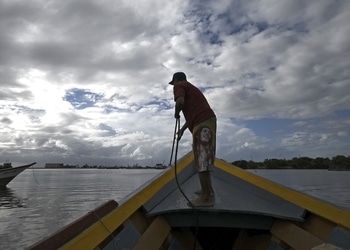Merchants traveling to Trinidad and Tobago, fishing vessels, even the occasional tourist: all are tempting targets for pirates off Venezuela’s northern state of Sucre.
In early October, Venezuela’s agency for maritime safety and rescue (Organización Nacional de Salvamento y Seguridad Marítima de los Espacios Acuáticos de Venezuela – Onsa) established new risk zones for pirate attacks in a new report, based on incidents in recent years.
The most dangerous area in the country, carrying the highest level of warning, was in the northern state of Sucre, especially the stretch of water between the city of Carúpano and the Paria national park.
This area received national attention in September due to the case of Fabio Tavares. On September 14, Tavares was sailing alone from Panama to his native Brazil. As he passed near the Paria península, off the coast of Sucre, he was allegedly intercepted by four boats, each reportedly carrying around ten men armed with automatic weapons. He set off a distress call but his ship was captured, towed back to shore in Venezuela and a ransom of $100,000 was allegedly demanded for his release.
SEE ALSO: Pirates Control Ocean Between Venezuela, Trinidad and Tobago
Two days later, Tavares arrived in Trinidad and Tobago where he told his story to authorities, stating he had been tortured in a camp where he had seen human remains. Questions remain unanswered about his experience, including whether any ransom was paid, why he was let go so quickly and who these remains belong to.
Despite these questions, this story is similar to others reported in the area. In 2020, over 150 attacks on vessels were reported in Sucre, up from 120 in 2019, according to data from the Venezuelan Violence Observatory (Observatorio Venezolano de Violencia — OVV).
In the report, Onsa also lamented the lack of action from the government. “From the Paria national park to Delta Amacuro, it’s out of control, it’s a danger zone. The authorities, including the army, should have control of the area…the level of criminality and piracy is far from normal,” said Onsa Secretary General Luis Guillermo Inciarte said at a press conference to release the report.
InSight Crime Analysis
While Onsa statistics show that piracy in Venezuela has increased steadily over the last ten years, the organization says the situation has become worse than ever.
According to Inciarte, reports of piracy attacks are dwindling, not because of fewer attacks, but because the groups responsible have a tighter rein on local communities and authorities do not respond.
“The gangs that attack ships off the Paria península have two modus operandi. Sometimes, they pretend their ships have broken down and they attack those who try to help them, or they send various boats to surround their targets, as happened with the [Fabio Tavares’s] Klinker,” Inciarte told InSight Crime.
Onsa also stated that the gangs of pirates have grown stronger. “We call them pirates but, while we don’t know the identity of these groups, their capacity to act can be compared to drug trafficking gangs who operate between Venezuela and the Caribbean,” explained Inciarte.
SEE ALSO: Venezuela’s Smaller Gangs Carve Out Local Criminal Fiefdoms
When asked about the lack of action from authorities, Iniciarte stated that certain officials likely received payments from pirates to let them operate, similarly to what happens with criminal groups on land.
One fisherman in Sucre confirmed these concerns. “When we go past Carúpano, we used to travel close to the coast, between 3 and 10 miles offshore. Now we have to travel 30 to 40 miles offshore because of the pirates in the area,” he told InSight Crime, speaking on condition of anonymity out of fear for his safety.
“They have very good ships, very big engines, they usually use two engines. There’s always 10 to 15 men on board, sometimes more. They come out armed to the teeth, in very fast boats, and intercept us,” the fisherman said.
However, he added that while the pirates have automatic weapons and grenades, the attacks have become less violent.
“It seems now like they have orders not to murder anyone but to take things, such as fuel, food and contraband,” he told InSight Crime.
The fisherman also decried the lack of intervention by authorities, stating that even the army is afraid of the pirates.
“This has led to a drop in traffic. It used to be full of boats here, it looked like a highway. Now, I’m often alone,” he concluded.

